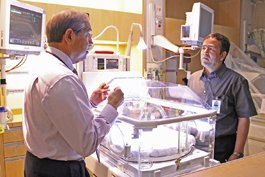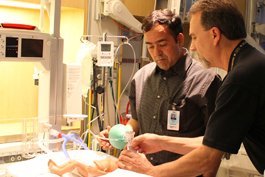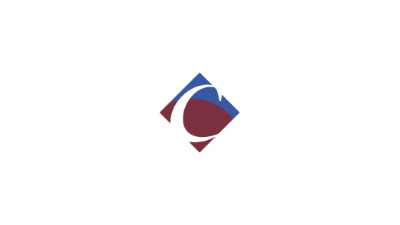The nursing director of Afghanistan’s first neonatal intensive care unit (NICU) came to Community Regional Medical Center to learn from experts about how to improve care for his tiniest patients. And in turn he shared his experiences caring for fragile newborns with little access to technology.
 |
| Dr. Krishna Rajani neonatologist and NICU medical director at Community Regional gives Afghani NICU nursing director Miagul Sahar a tour of the Level III NICU. |
Miagul Sahar, nursing director of the Afshar Hospital in Kabul, Afghanistan, became connected to the downtown Fresno hospital a few years ago while setting up his native country’s first NICU. Davena Witcher, executive director of Fresno nonprofit American Medical Overseas Relief (AMOR), which funds the Afshar hospital, explained that she reached out to Dr. Krishna Rajani, neonatologist and medical director of Community Regional’s Level III NICU, to help Sahar write new nursing regulations.
“Dr. Rajani generously shared [Community Regional’s NICU] policies and procedures with us,” she said. “Miagul was excited to get a chance to see how they work here and to meet Dr. Rajani.”
Community Regional serves as the high-risk pregnancy and birthing center for a five-county region and for the past several years has delivered the most under-3 pound babies in the state. The 84-bed Level III NICU is equipped with the latest advancements in ventilator, temperature regulation and monitoring technology and has a dedicated neonatal pharmacist who is an expert in the medications, fluids and nutrition that ill babies need.
Sahar was in California to receive an international humanitarian award and was able to spend two weeks in Fresno furthering his medical training. Sahar’s work in his native country to prevent childbirth deaths was honored with an “Unsung Heroes of Compassion” award from the Wisdom in Action organization. The Dalai Lama helped present the award to Sahar and 50 other recipients at a Feb. 23 ceremony in San Francisco.
 |
| Miagul Sahar, (left) nursing director of Afghanistan’s first NICU, learns more about respirator technology for newborns from Curt Partain, a clinical educator in respiratory care at Community Regional. |
Sahar’s connection to Community Regional deepened as he spent time training with and shadowing NICU respiratory therapists and neonatologists and when he returned to Afghanistan in mid-March with specialized infant resuscitators, humidity chambers and intubation equipment donated by Community Regional’s NICU.
On this first day at Community Regional, Sahar bent intently over a training manikin in the NICU learning how to regulate air flow into the fake newborn’s chest, fiddling with a gauge with one hand and with the other gently and rhythmically squeezing a bag connected to a tiny face mask. Curt Partain, RCP, RRT, NPS, a clinical educator for respiratory care at Community, was explaining what to pay attention to: “If you can’t effectively move the chest this way, then you have to intubate. But if the lungs are too full than the heart can be compressed and it is affected.”
Sahar nodded and observed, “We tell this by feeling the chest. If there’s no movement, our work has failed, so we have to do other things.”
Partain and Hank Perry, RCP, RRT, a respiratory care clinical coordinator, marveled at the skill it would take to know just by feel whether a baby was being assisted correctly with the manual respirator. The men talked about research showing that too much oxygen could be toxic to newborn’s lungs. Sahar nodded and jotted down notes and tucked away training curriculum developed by Perry and Partain.
Dr. Rajani led Sahar through Community Regional’s NICU pointing out equipment and explaining its uses. Patting an incubator, Dr. Rjani shared, “This costs $40,000 – as much as a car. But you don’t need expensive technology. It’s the simple things that will give you big results. Keep babies warm and feed them breast milk.”
During his visit Sahar lectured at UCSF Fresno about how his hospital concentrates on those simple things to make big differences. In a country where huge numbers of women and babies die in childbirth and few give birth with a doctor present, AMOR and Sahar are also working to educate women to come to the hospital when they’re at risk for a premature delivery or when they’re expecting twins.
“We’ve started with the basics, but we want to improve with good technology and better education for our nursing care,” Sahar said. Witcher said Sahar was thrilled to be able to observe a high risk delivery at Community Regional and was particularly impressed with the level of infection control he saw everywhere.
“What Miagul learned during those two days at [Community Regional] will impact the quality of care he and the staff at Afshar hospital provide for years to come,” Witcher said.
Erin Kennedy reported this story. She can be reached at MedWatchToday@CommunityMedical.org.


